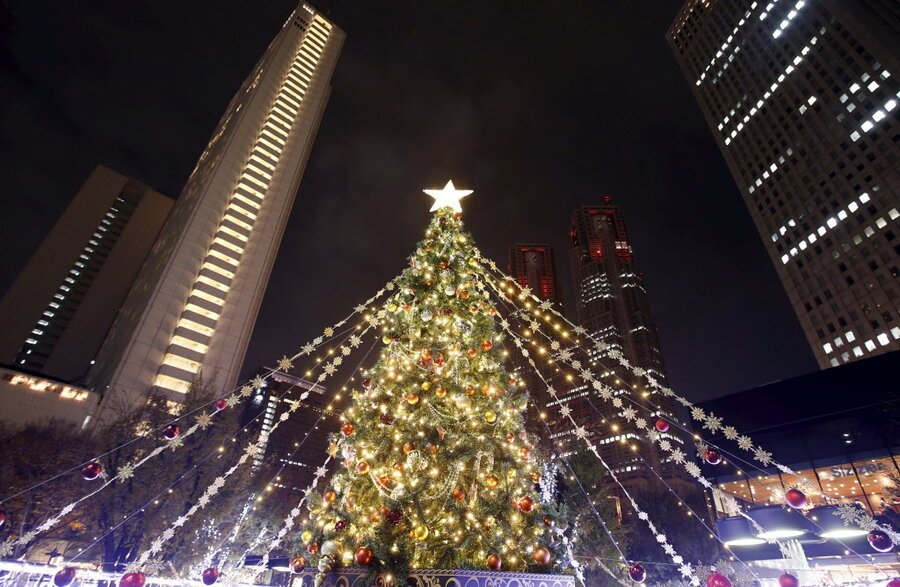The holiday season is a time when people all over the world celebrate with their families and friends. It is a time of celebration and joy that is celebrated by people all over the world with their loved ones. However, the holidays in some parts of the world are more than just a time for celebration and joy, but also a time to bond with people and see family members, friends and family whom you have not seen in a long while. In this article, we shall examine some of the most celebrated seasonal festivals.
One of the most widely celebrated holidays in the world is Christmas, which is commemorated by Christians on December 25th. The holiday marks the birth of Jesus Christ and is a time for family gatherings, gift-giving, and festive activities.
Another popular holiday that is celebrated during the winter season is Hanukkah, which is a Jewish festival that lasts for eight nights. Hanukkah is a time for family, friends, and giving gifts.
Along with these, New Year’s Eve is also an important celebration that takes place on December 31st all over the world. This holiday is marked by parties, champagne, and countdown celebrations. Overall, the holiday season is a time for people to come together and celebrate with their loved ones, regardless of the specific holiday they celebrate.
You’ve just seen a list of some of the most celebrated seasonal festivals around the world. The holiday season is a time for family, friends, and celebration whether you observe Christmas, Hanukkah, or New Year’s Eve.

Top 14 most popular seasonal holidays around the world.
There are countless holidays that are celebrated around the world, each with its own unique customs and traditions. Some of these holidays are considered to be particularly meaningful and special, and they stand out among the rest. These holidays can come from different cultures and religions, and they offer a great opportunity to learn about and appreciate the diversity of our world. Here are ten of the most notable and festive holidays from different cultures that are truly worth experiencing and celebrating.
1. Christmas
Christmas is an annual religious holiday that is celebrated by Christians worldwide. It observes the birth of Jesus Christ and is typically recognized with feast, gift-giving, and family gatherings. Additionally, Christmas is a time of contemplation and introspection. Many people use the occasion to reflect on the past year, set new goals for the coming one, and take stock of the blessings they have received.
Christmas is a time to express gratitude and appreciate the good things in life. It is also an opportunity to extend generosity and kindness towards those who are less fortunate, to reach out to those who may be lonely or in need, and to spread love and compassion in the community. Overall, Christmas is a time of celebration, reflection, love and giving.
2. Eid al-Fitr
Eid al-Fitr is a significant Islamic holiday that marks the end of the month of Ramadan, a month of fasting and spiritual reflection for Muslims. During this holiday, Muslims traditionally celebrate with feasts, family gatherings, and by giving to the less fortunate.
Giving to those in need is a fundamental aspect of the Muslim faith, and Eid al-Fitr is considered an ideal time to put this into practice. The Quran encourages Muslims to assist the poor and needy, and Eid al-Fitr provides an opportunity for individuals to do so.
There are several ways to give to the less fortunate during Eid al-Fitr, one of which is to donate to local charities or food banks. This ensures that the donation reaches those who are most in need. Another way to give is by volunteering time at a local soup kitchen or homeless shelter, which is a great way to give back to the community and make a positive impact on others.
In conclusion, the act of giving is an essential part of the Muslim faith, and Eid al-Fitr is a perfect time to put this into action by assisting those less fortunate. It serves as a reminder to put others before ourselves, to reflect on our blessings and to give back to the community.
3. Eid al-Adha
Eid al-Adha is an important Muslim holiday that commemorates the willingness of Abraham to sacrifice his son for God. The holiday is marked by a number of customs and traditions, including feasts, animal sacrifices, and acts of charity.
One of the key elements of Eid al-Adha is the emphasis on family, friends, and community. Many people use this time to come together with loved ones and reflect on their faith and give thanks for what they have. The holiday is also an opportunity to remember those who are less fortunate and to help them in any way possible.
Animal sacrifices are an important part of the holiday and serve as a reminder of the sacrifice made by Abraham. The meat from the sacrificed animals is typically distributed to the poor and needy, as a way to provide them with sustenance during the holiday season. Additionally, gifts are often given to the poor and needy as a way to help them during this time of celebration. Overall, Eid al-Adha is a time for reflection, gratitude and also for giving back to the community.
4. Hanukkah
Hanukkah is a Jewish holiday that is observed for eight days and nights and commemorates the rededication of the Holy Temple in Jerusalem in the 2nd century BCE. The name Hanukkah means “dedication” in Hebrew. It is typically celebrated with the lighting of the menorah, a special candle holder with eight branches and a ninth “helper” candle, known as the shamash, used to light the other candles. Each night, one additional candle is lit until all eight candles are lit on the final night. The menorah is often placed in a window to share the light with others.
In addition to lighting the menorah, traditional Hanukkah foods such as latkes (potato pancakes) and sufganiyot (jelly doughnuts) are also consumed. These foods are fried in oil, which is symbolic of the miracle of the oil that burned for eight days in the Temple when it was rededicated.
One of the most unique aspects of Hanukkah is that it is not mentioned in the Torah, the Hebrew Bible. Rather, it is mentioned in the books of the Maccabees, which are not part of the Hebrew Bible. This has led some to believe that Hanukkah was not originally a religious holiday, but rather a political one. The story of Hanukkah is about the Jewish revolt against the Greek-Syrian ruler Antiochus IV Epiphanes, who attempted to suppress Jewish religious practices and impose Greek culture on the Jewish people.
However, over time Hanukkah has taken on religious significance. For many Jews, it is a time to remember and celebrate their religious heritage and connection to the land of Israel and the Jewish people as a whole. It is also a time for giving and charity, as Jews donate money to charity and give gifts to loved ones. This is in keeping with the spirit of the holiday, which is about giving thanks for what we have and helping those in need.
5. Rosh Hashanah
Rosh Hashanah, also known as the Jewish New Year, is a significant holiday in the Jewish calendar. It typically falls in the months of September or October and is a time for Jewish people to reflect on their past actions and seek forgiveness, known as repentance. It is also a time to celebrate and give thanks for the new year and all the possibilities it brings. The holiday is marked by prayers, special meals, and the sounding of the shofar, a traditional instrument made from a ram’s horn. It is one of the High Holidays, and the start of the High Holy Days, which last until Yom Kippur.
6. Yom Kippur
Yom Kippur, also known as the Day of Atonement, is considered the most sacred and significant day in the Jewish calendar. It is a time for individuals to engage in introspection and reflection, and to seek forgiveness for any wrongs committed in the past year. During this day, Jews typically participate in fasting, which is considered a means of purifying the body and soul, and also engage in prayer and repentance. It is also a time to seek forgiveness from others, and to make amends for any harm caused. The themes of atonement and repentance are central to the observance of Yom Kippur, which is considered a day of spiritual renewal and a time to start anew.
7. Diwali
Diwali is a Hindu festival that is celebrated to commemorate the triumph of good over evil. It is considered one of the most significant holidays in Hinduism and is typically marked by feasting, decorating, and lighting fires. The festival is also a time for expressing gratitude for the blessings of the past year and for seeking continued protection and prosperity in the coming year. According to Hindu beliefs, Diwali is a time when the goddess of wealth and prosperity, Lakshmi, visits homes and bestows her blessings. Many Hindus prepare their homes and themselves for Lakshmi’s arrival during this holiday.
Diwali is also an occasion for gift-giving and hosting parties and feasts with family and friends. They will get together to celebrate the holiday, often exchanging gifts and eating special Diwali foods.
8. Holi
Holi, also known as the Festival of Colors, the Festival of Spring, and the Festival of Love, is a religious Hindu holiday that celebrates the arrival of spring. Holi is an ancient tradition that is celebrated by people from India and neighboring countries, usually in the springtime. Holi is a celebration of light, color and the renewal of life, symbolizing the return of sunlight after winter. The key elements of the Holi festival include wearing brightly colored clothes, visiting friends and family, playing games and participating in traditional ceremonies.
9. Easter
Easter is a significant seasonal holiday celebrated by Christians worldwide, commemorating the resurrection of Jesus Christ from the dead. It is typically celebrated in April or early May and is known for its various traditions and celebrations.
One of the most popular traditions associated with Easter is the practice of egg hunting, where children search for decorated eggs hidden in gardens or other outdoor spaces. Another popular tradition is the decoration of Easter eggs, which can be dyed in various colors and decorated with intricate designs. Additionally, the Easter bunny is also a common symbol associated with the holiday, with many families participating in bunny rabbit hunts and enjoying Easter-themed treats.
Beyond the fun and festive traditions, Easter is also an important time for Christians to reflect on their faith and participate in religious services. Millions of people around the world attend church services, where they listen to sermons, sing hymns, and participate in communion. Additionally, many families also enjoy traditional Easter foods and drinks such as ham, lamb, and Easter bread.
Moreover, Easter also symbolizes the arrival of spring, which is a time of renewal and new beginnings. It is a time to celebrate new life, the beauty of nature, and the hope that the season brings. Overall, Easter is a significant holiday that brings people together, fostering a sense of community, and celebrating the resurrection of Jesus Christ, the arrival of spring and the hope for new beginnings.
10. Thanksgiving
Thanksgiving is a widely celebrated holiday that is observed in various countries such as the United States, Canada, Grenada, Saint Lucia, and Liberia, usually on different dates. It is a time when families gather together to spend time with loved ones, reflect on the blessings in their lives, and express gratitude for all that they have.
There are many traditions associated with Thanksgiving, such as preparing and enjoying a traditional Thanksgiving meal that typically includes a roast turkey, stuffing, cranberry sauce, pumpkin pie, and sweet potatoes. It’s a time of coming together, sharing meals and expressing gratitude for the people and things in our lives.
11. New Year’s Eve
New Year’s Eve is a time to look back on the past year and make plans and resolutions for the upcoming one. It is also a time to celebrate with loved ones and friends, and to stay up late to mark the arrival of the new year.
People often celebrate by going out and partying, or by staying in and watching a New Year’s Eve movie. Regardless of how you choose to celebrate, it’s important to make it a joyous and festive occasion.
12. Lunar New Year
The Lunar New Year is celebrated in many Asian countries. It is a time to welcome in the new year and to celebrate the beginning of a new lunar cycle. The Lunar New Year is as follows:
Chinese New Year – Late January to Late February
Chinese New Year, also known as Lunar New Year, is a traditional holiday celebrated by Chinese communities around the world. It marks the start of the lunar calendar and is typically marked by fireworks, lavish meals, and the exchange of gifts. The holiday is also a time for people to reflect on the past year, set goals for the upcoming one, and celebrate the importance of tradition and family. People get together with their families and friends, exchange greetings and well wishes, and enjoy food and festivities.
Bhutanese New Year – Mid-March
The Bhutanese New Year, also known as Losar, is a traditional festival celebrated in Bhutan to mark the beginning of the Lunar New Year. It is a time for families to gather together, celebrate the start of a new year, and reflect on the past. People make offerings to deities, prepare traditional foods and engage in rituals. It is also a time for people to reflect on the past year and set intentions for the upcoming one, as well as to enjoy the company of loved ones and participate in various cultural and religious activities.
Japanese New Year – 1 January
Japanese New Year is the most important holiday in Japan. It is traditionally celebrated with family gatherings, visiting shrines and temples, and the exchange of gifts. It is also a time for people to reflect on the past year and set goals for the upcoming one. For many people, it is a time to evaluate their lives and make resolutions for personal growth and improvement. It is a time to spend with family, friends, and loved ones and to look forward to the new year with hope and optimism.
Tibetan New Year – Late January to Early February
Tibetan New Year is a traditional holiday celebrated by the Tibetan people to mark the beginning of the Tibetan calendar. It is a time for families to gather together and celebrate with feasts, singing, and dancing. People make offerings to deities, prepare traditional foods and engage in rituals. It is also a time for people to reflect on the past year and set intentions for the upcoming one, as well as to enjoy the company of loved ones and participate in various cultural and religious activities.
13. Carnaval
Carnaval is a pre-Lenten festival celebrated globally, known for its vibrant parades, elaborate costumes, and festive parties. It is a time for self-reflection, tradition and cultural celebration. As people participate in the festivities, they often take the opportunity to reflect on the past year and set intentions for the coming one. For many, Carnaval is a time to connect with their heritage, culture and community. It is a time to come together and celebrate the unique aspects of themselves and their community. This year, I have come to appreciate the significance of Carnaval in my life.
It is a time to strengthen my relationships with my loved ones and to honor my ancestors. I am grateful for the joy and unity it brings, and the reminder of the things that truly matter in life.
14. Día de Los Muertos
Día de Los Muertos, or Day of the Dead, is a Mexican holiday that celebrates the lives of those who have passed away. It is traditionally a time for family and friends to come together to remember and honor their dead loved ones.
Final Thoughts
Seasonal holidays are popular celebrations that occur throughout the year and are celebrated by people of all cultures and religions. They offer an opportunity to enjoy family time, connect with friends, and reflect on the past year. These holidays often have unique traditions and celebrations, such as decorating, gift-giving, and traditional meals. They are a great way to bring people together and create memories during the holiday season.
So, if you’re looking for something to do during the holiday season, be sure to check out some of these seasonal holidays.






